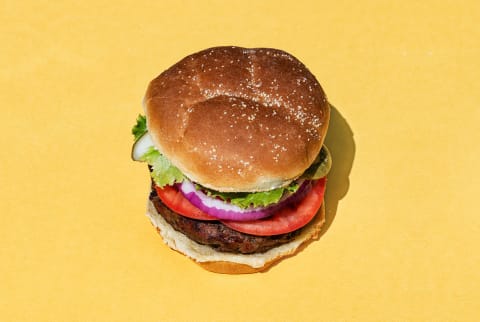Advertisement
The "Lower-Methane Burger" Offers A New & Slightly More Sustainable Way To Eat Meat


On Tuesday, Burger King announced an unusual new menu item: beef patties sourced from cows that were fed lemon grass. In keeping with other recent menu adds like the Impossible Croissan'wich, it's meant to signal a move toward a slightly more sustainable fast-food future.
How Burger King is working to reduce the methane emissions of its beef.
Through a partnership with two research groups, the chain has found that lemon grass can reduce the amount of methane that cows emit during digestion. The fermentation process that occurs in cow rumen, called enteric fermentation, gives off methane gas as a byproduct. When the cow burps or farts, this methane gas is then released into the atmosphere.
When present in excess, methane is 28 times more powerful than carbon dioxide at trapping heat over a 100-year period. Levels of the greenhouse gas in the atmosphere have officially reached the highest point on record, according to a report released this week by Stanford's School of Earth, Energy & Environmental Sciences.
According to Burger King's ongoing research, the addition of 100 grams of lemon grass to feed reduces methane emissions by an average of 33% a day during the final three to four months of the cow's life. However, this figure is not conclusive, and the research has not been peer-reviewed, which has led some in the scientific community to encourage consumers to take it with a grain of salt.
Burger King is now piloting the new beef in five restaurants across the U.S. in the hopes of expanding globally in the future. It'll be sold at the same price point as a normal Whopper and presumably taste the same, too.
The potential impact.
While the fast-food industry has historically been an environmental nightmare, BK says they hope the innovation will lead to some widespread change in burger joints across the country.
"We believe there is significant potential for Cows Menu to drive wider industry improvement, so we are making our scientific research, [lessons] and protocol formula publicly available in an open-source manner to support this," Fernando Machado, global chief marketing officer for Restaurant Brands International, the parent company of Burger King, said in an email to the Washington Post.
Though relatively small (for now), the rollout has prompted Burger King to release a nationwide ad campaign on the importance of reducing methane emissions in animal agriculture.
Other companies like Mootral, a feed supplement that reduces methane gas using garlic powder and citrus, are working behind the scenes to do the same thing. "We're trying to demonstrate to the broader community what is possible by integrating such a simple solution into farm management practices," Mootral's marketing director told mbg in 2018.
When combined with other factory farming reforms, this little fix could help carnivores enjoy meat in a way that's less environmentally damaging. And that's something we'll raise the proverbial patty to.